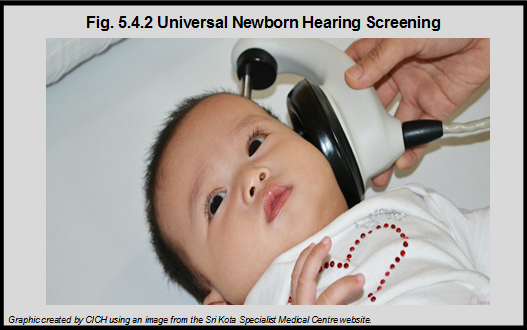Universal Newborn Hearing Screening

When infants are born with hearing loss, significant problems in infant and child development can occur if the loss is not detected and treated.
While there are many known risk factors for hearing loss, approximately 50% of infants with hearing loss have no known risk factors.1, 2, 3
Infants who are diagnosed early and receive appropriate interventions tend to have better language skills, social adjustment and behaviour scores, compared with children who receive services late.2
When population-based infant hearing screening is not in place, the average age of diagnosis for hearing loss is 24 months.
The evidence shows that screening all newborn infants for hearing loss is very effective.5,6,7 Based on this research, the U.S. Preventive Care Task Force has recommended that all newborn infants be screened for hearing loss.4 As a result of this, universal newborn hearing screening programs are widely implemented in the U.S., Europe and elsewhere. The U.S. recommendation is endorsed by many professional groups including the Canadian Paediatric Society.1
1Patel H, Feldman M, Canadian Paediatrics Society. Universal newborn hearing screening. Paediatrics and Child Health 2011;16:301-5.
2American Academy of Pediatrics. Joint Committee on Infant Hearing. Year 2007 position statement: Principles and guidelines for early hearing detection and intervention program. Pediatrics 2007;120:898-921.
3Thompson DC, McPhillips H, David RL, Lieu TL, Homer CJ, Helfand M. Universal newborn hearing screening: Summary of evidence. JAMA 2001;286:2000-10.
4U.S. Preventive Services Task Force. Universal screening for hearing loss in newborns: U.S. Preventive Services Task Force Recommendation Statement. Pediatrics 2008;122:143-148.
5Le dépistage de la surdité chez le nouveau-né: évaluation des avantages, des inconvénients et des coûts de son implantation au Québec. Rapport produit par un comité d’experts à la demande de l’Institut national de santé publique du Québec. Février 2008. www.inspq.qc.ca/publications/notice -accessed July 21, 2017.
6Gorga MP, Neely ST. Cost-effectiveness and test performance factors in relation to universal newborn hearing screening. Ment Retard Dev Disabil Res Rev 2003;9:103-8.
7Porter HL, Neely ST, Gorga MP. Using benefit-cost ratio to select universal newborn hearing screening test criteria. Ear Hear 2009;30;447-57.
